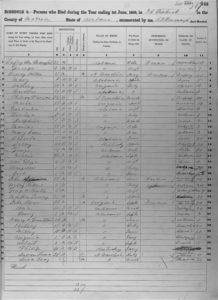The 1850, 1860, 1870, 1880, and 1885 censuses included inquiries about persons who had died in the twelve months immediately preceding the enumeration. The 1850, 1860, 1870, and 1880 Alabama mortality census all survived. Mortality schedules list deaths from 1 June through 31 May of 1849–50, 1859–60, 1869–70, 1879–80, and 1884–85. They provide nationwide, state-by-state death registers that predate the recording of vital statistics in most states. While deaths are under-reported, the mortality schedules remain an invaluable source of information.
Mortality schedules asked the deceased’s name, sex, age, color (white, black, mulatto), whether widowed, his or her place of birth (state, territory, or country), the month in which the death occurred, his or her profession/occupation/trade, disease or cause of death, and the number of days ill. In 1870, a place for parents’ birthplaces was added. In 1880, the place where a disease was contracted and how long the deceased person was a citizen or resident of the area were included (fractions indicate a period of time less than a year).
Before the National Archives was established in 1934, the federal government offered the manuscripts of the mortality schedules to the respective states. Those schedules not accepted by the states were given to the National Library of the Daughters of the American Revolution. Copies, indexes, and printed schedules are also available in many libraries.
The United States Census Mortality Schedule Register is an inventory listing microfilm and book numbers for the mortality schedules and indexes at the Family History Library. An appendix lists where the records are found for twelve states whose schedules are not at the library. Originally compiled by Stephen M. Charter and Floyd E. Hebdon in 1990, the thirty-seven-page guide was revised by Raymond G. Matthews in 1992. The second edition includes twelve pages of introduction to this important material. While the reference is not available in book form outside the reference area of the Family History Library, the library has reproduced it on microfiche that can be borrowed through LDS Family History Centers and a few other libraries. 1
Mortality schedules are useful for tracing and documenting genetic symptoms and diseases, and for verifying and documenting African American, Chinese, and Native American ancestry. By using these schedules to document death dates and family members, it is possible to follow up with focused searches in obituaries, mortuary records, cemeteries, and probate records. They can also provide clues to migration points and supplement information in population schedules.
Alabama Mortality Census Images
U.S. Federal Census Mortality Schedules, 1850-1885 $$$
This database contains an index to individuals enumerated in these mortality schedules. In addition, each individual is linked to the census image on which they appear. Not all information that is recorded on the actual census is included in the index. Therefore, it is important that you view the image on which your ancestor is recorded to obtain all possible information about him/her. This database often included the names of the slave owners whose slaves had passed – please search in the ‘Other’ field to locate slave owners.
United States Census (Mortality Schedule), 1850
Name index and images of mortality schedules listing inhabitants of the United States who died between June 1849 and May 1850. This was the first time a mortality schedule was included with the general population census schedule. Searchable data and browse are available for the following: Alabama, Arkansas, Connecticut, Delaware, District of Columbia, Georgia, Illinois, Indiana, Iowa, Kentucky, Louisiana, Maine, Maryland, Massachusetts, Michigan, Mississippi, New Hampshire, New Jersey, New York, North Carolina, Ohio, South Carolina, Tennessee, Texas, Utah, and Virginia. Mortality schedules are not available at all for other states.
Free Alabama Mortality Census Records by County Alabama
These free listings provide access to indices and transcriptions of the Alabama mortality census records. Some transcriptions only recorded black deceased, and are therefor incomplete to non-blacks.
Autauga County Alabama
Baker County Alabama
Baldwin County Alabama
Barbour County Alabama
Bibb County Alabama
Blount County Alabama
Butler County Alabama
Calhoun County Alabama
Chambers County Alabama
Cherokee County Alabama
Choctaw County Alabama
Clarke County Alabama
Clay County Alabama
Coffee County Alabama
Colbert County Alabama
Conecuh County Alabama
Coosa County Alabama
Covington County Alabama
Dale County Alabama
Dallas County Alabama
Fayette County Alabama
Hancock County Alabama
Henry County Alabama
Hood County Alabama
Jackson County Alabama
Jefferson County Alabama
Lauderdale County Alabama
Lowndes County Alabama
Macon County Alabama
Marengo County Alabama
Marion County Alabama
Morgan County Alabama
Randolph County Alabama
Shelby County Alabama
- 1850 Shelby County Alabama
- 1860 Shelby County Alabama
- 1870 Shelby County Alabama
- 1880 Shelby County Alabama
Walker County Alabama
Washington County Alabama
- 1860 Washington County Alabama
- 1860 Washington County Alabama – Page 1
- 1860 Washington County Alabama – Page 2
- 1860 Washington County Alabama – Page 3
Wilcox County Alabama
- 1860 Wilcox County Alabama – Page 1
- 1860 Wilcox County Alabama – Page 2
- 1860 Wilcox County Alabama – Page 3
- 1860 Wilcox County Alabama – Page 4
Winston County Alabama
Citations:


